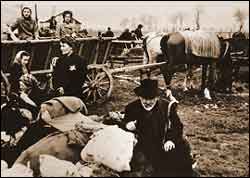Page 4 of 8 |
Continued from page 3
''This complicated question has advanced considerably as several thousand Jews have been concentrated in one city in the Protectorate,'' Rivas wrote. ''In any case, one always sees in the large cities many people decorated with the Great Star of David, a special distinction granted to the sons of Israel. The Jews and particularly the Jewesses are very indiscreet, as they wear the most conspicuous and showy costumes.
|
|
''No wonder such violent measures are taken against this race.''
He also noted that many Jews were awaiting visas from the consulate to enter Chile, but the envoy's sympathies made it unlikely any were granted.
In the same dispatch, which the routing notes indicate reached Donovan and the State Department that June, Rivas notes the arrival of a new top German police chief: Reinhard Heydrich, a ''very young, saber champion of Europe, the right arm of [Heinrich] Himmler, high Pontiff of the Gestapo.
''He came with great enthusiasm to put things in the places in which he thought they should be, discovered many plots, and sabotage in many places. Result: absolute dictatorship, executions the order of the day and night. The least fortunate criminals are simply hung; into this category come Jews and Black Market traders.''
Heydrich had already corralled Jews into the ghettos of Poland and managed their mass deportation from Germany and Austria. He chaired the Wannsee conference outside Berlin in January 1942, at which the Final Solution was outlined for top government officials.
But Heydrich's stint in Czechoslovakia ended abruptly. Agents of the Czech underground assassinated him in May 1942. In reprisal, the Nazis murdered every male older than 16 in the town of Lidice and killed roughly 1,500 men, women, and children in Prague.
Like another significant document unearthed by the presidential commission last year - which indicated the Allies knew that the Germans were going to kill all the Jews in Rome a week before they did - the Chilean dispatch is expected to heat up the debate between historians who believe that the Jews were abandoned by the West, and those who believe millions were saved by the Allied decision to pursue all-out war with no negotiations except the Axis' unconditional surrender.
Breitman believes there likely wasn't a military solution to the Holocaust, but that Western leaders could have been more vocal about condemning it, and could have persuaded neutral countries to provide sanctuary to otherwise doomed Jewish refugees.
''In terms of using the information and mounting a political and diplomatic effort, the West fell down,'' he said. ''There were countries like Switzerland or Spain or Turkey that were turning away refugees that had been escaping.''
Others disagree.
''Our moral priorities were to win the war. Lots of people were dying,'' said Ron Zweig, a Tel Aviv University historian. ''People tend to [blame Allied] callousness [on] the Jews. But a lot of people making the decisions were Jews.''


 Jewish deportees arriving May 21, 1942, in Kralovsky-Chlumae, Czechoslovakia, an invaded land dubbed a Nazi "protectorate."
Jewish deportees arriving May 21, 1942, in Kralovsky-Chlumae, Czechoslovakia, an invaded land dubbed a Nazi "protectorate."